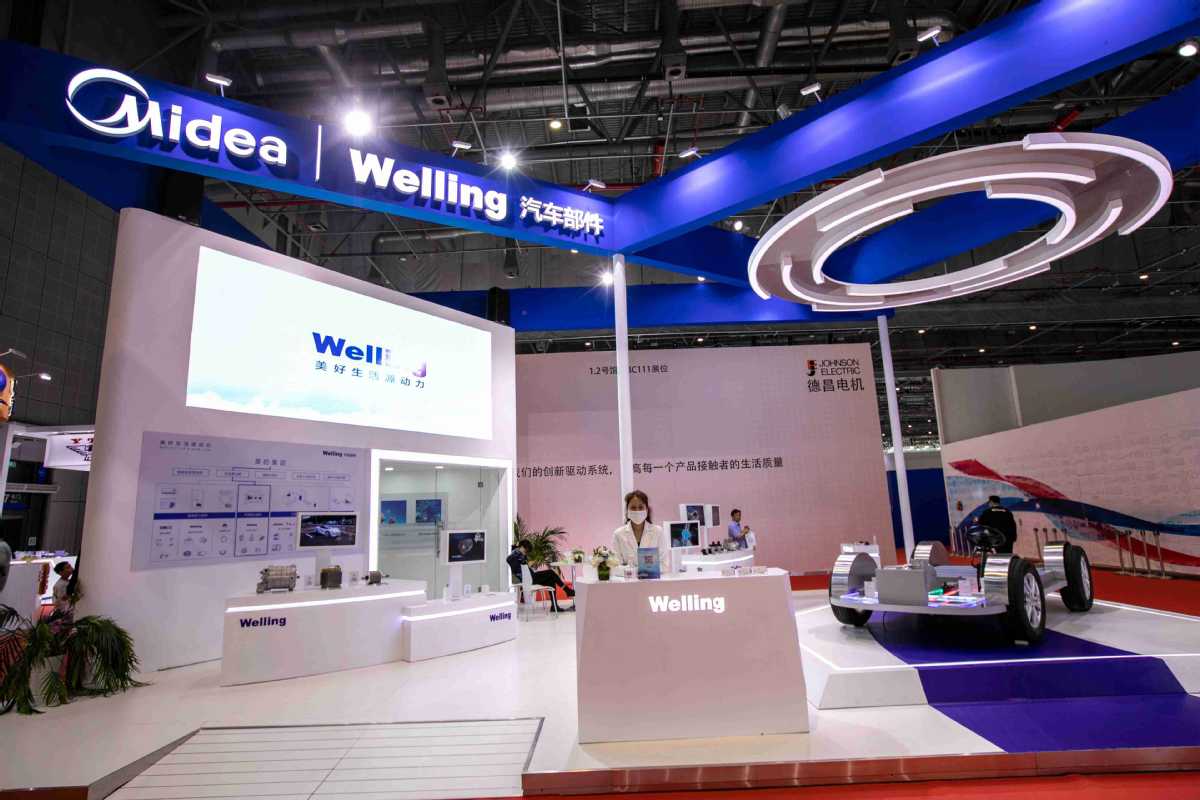Home appliance makers jump into NEV market


Giants expanding from toasters to tires for additional growth points
Chinese home appliance manufacturers have quickened their moves into the booming new energy vehicle sector, as the appliance market is almost saturated, and they need to diversity product portfolio and find new areas for growth, industry experts said.
New technology and software are crucial for NEVs, and home appliance makers possess expertise in electronic devices and software.
Still, they said, NEVs represent a new field that will require an enormous investment for appliance makers, who lack sophisticated technologies and operational experience in the automobile industrial chain. It also takes a long time for new entrants to build product awareness and credibility among consumers.
Home appliance giant Midea Group has recently begun the construction of a new plant that will make components for NEVs. The plant is in Anqing, Anhui province, and is being built with a total investment of 11 billion yuan ($1.73 billion).
The company, based in Foshan, Guangdong province, said the factory will focus on producing power steering motors, NEV electric compressors and drive motors for the vehicles. When completed, it will be able to manufacture 60 million auto parts per year and generate annual revenue of 40 billion yuan.
The new strategic center established by Midea-after investing in Anhui Welling Auto Parts Co Ltd-demonstrates the company's determination to use its technological assets to make a major mark in the auto parts sector.
Midea said it plans to invest $1 billion over the next decade to overcome technical difficulties, aiming to engage with all areas of NEV production.
It will also build a research and development center and national laboratory for thermal management, main and auxiliary drives and intelligent driving systems at the plant.
Fu Yongjun, vice-president at Midea, said the NEV components center is one of the largest investments in the company's history, and he hopes it will provide strong support for the automobile industry in Anhui.
"Investment in NEVs is a very important strategic direction for Midea for the future," said Fang Hongbo, chairman and president of Midea, adding that the company will implement a development strategy to help forge a new growth engine.
Midea stepped into the fast-growing sector in 2018, establishing NEV parts companies in Guangdong and Anhui provinces. Five types of products covering three production lines-motor drives, thermal management and auxiliary or autopilot systems-have completed testing and gone into mass production.
Industry insiders said the electrification and intelligent systems are the two most important parts for the future development of the automobile industry, as China aims to peak carbon dioxide emissions by 2030 and achieve carbon neutrality by 2060.
"The NEV industry is gaining growth momentum across the globe as more than 20 countries and regions have released schedules to ban the sale of gasoline-fueled automobiles. Meanwhile, consumers have shown growing enthusiasm and demand for NEVs," said Zhao Meimei, assistant president of All View Cloud or AVC, a Beijing-based consultancy specializing in home appliances.
Zhao said growth in the domestic home appliance business is slowing, while the NEV market presents huge development potential and has attracted many home appliance makers.
The revenue of China's home appliance sector in 2021 reached 760.3 billion yuan, up 3.6 percent year-on-year, but saw a drop of 7.4 percent compared with 2019, according to AVC.
There are relatively fewer technological obstacles to producing electric vehicles compared with gasoline-powered cars, Zhao said, noting that Chinese home appliance makers have been engaged in research and development in intelligent manufacturing for many years and have accumulated technological strengths applicable to auto components.
But they also are facing intense competition from traditional carmakers, internet tech giants and NEV startups, such as Tesla, Nio and Xpeng, Zhao said. "As latecomers, the big problem for Chinese home appliance companies is how to establish brand awareness and further expand technological advantages."
China's NEV market has seen explosive growth, and sales of NEVs are expected to surpass 6 million units in 2022, accounting for about 22 percent of all vehicle sales, according to the China Passenger Car Association.
A total of 2.99 million new energy passenger cars were sold last year, surging by 169 percent year-on-year, according to the CPCA. NEVs include electric vehicles, plug-in hybrids and hydrogen fuel-cell energy vehicles.
China has ranked first globally in NEV sales for seven consecutive years, according to the Ministry of Industry and Information Technology.
Anticipating huge growth potential and promising prospects in the lucrative industry, other home appliance giants including Hisense and Gree Electric Appliances, which are facing tough competition in the appliance market, have jumped on the NEV bandwagon.




































